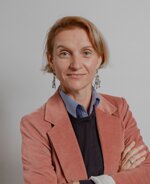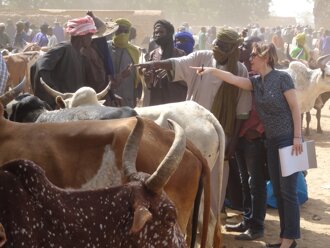'We firmly believe in the benefits of digital applications for development cooperation'

©SNV
For ten years, the Netherlands invested in the Geodata for Agriculture and Water (G4AW) programme. In this series, key players reflect on the past and look to the future. Catherine Le Côme, Deputy Global Sector Head Agri-Food at SNV, foresees a bright future for digitalisation in development cooperation.
SNV is an NGO striving for a better world for everyone. Why did you choose this line of work?
'I am acutely aware of how privileged I am. That’s precisely why I find it essential to contribute to a more equitable world for all. SNV is a mission-driven global development partner dedicated to contributing to the Sustainable Development Goals. We strive to enable sustainable and more equitable lives for all by transforming agri-food, energy, and water systems. One of my key responsibilities is to ensure our projects align with the specific needs of local communities, fostering their active participation and ownership of these initiatives. These collaborations are crucial to achieving results.'
SNV worked on the STAMP and MODHEM projects for pastoralism and agriculture in Mali and Burkina Faso. What impact have these projects had in the region?
'Our aim was to enhance the resilience of pastoralists and smallholders farmers. Together with the NSO, mobile network provider ORANGE, the Dutch company Hoefsloot Spatial Solutions (HSS), pastoralists and farmers organisations, and the Ministry of Livestock, we developed GARBAL. This is a satellite data-based application that enables food producers to make well-informed decisions. Where can I graze my livestock? Where will I get the best price for my cattle? How can I optimize my harvest? GARBAL is operational in Mali, Burkina Faso and Niger. In Burkina only we have 260,000 unique users since 2019. In Burkina Faso, 93% of users report making decisions based on GARBAL’s information. 92% say it has reduced livestock mortality and/or increased their productivity. We received similar feedback from Mali.'
What was the key to this success?
'At first glance, it was an unlikely combination of partners. Before the G4AW programme, it was highly improbable for a government organisation to collaborate with a satellite data provider, a telecom company, an NGO, and a local community in Burkina Faso or Mali. But that is exactly what we did. We bridged cultural differences and achieved success together by operating step by step. Starting from the needs of the pastoralists and farmers, through a pilot project, we continuously improved our service.'

©SNV
GARBAL is central to this. How did you get farmers to use digital applications like satellite data?
'Our call centre was crucial in this regard. Users can call between six in the morning and nine at night. They are assisted in French or in their local language by call operators. Many people in Burkina Faso and Mali have limited or no access to the internet. Through simple mobile phones, we can still provide them with high-tech but vital information. We hear from users that they have built a relationship of trust with the call centre staff. This personal connection is highly valued.'
What potential do you see for new digital services in development cooperation?
'The potential is immense, especially if you combine various services. One bottleneck for pastoralists and farmers is their lack of access to traditional financial systems. Digital solutions can address this. We’d like pastoralists and farmers make payments via GARBAL using their mobile phones. They will not need to open a bank account or carry cash, which is much safer. Linking satellite services to insurance and microcredit services enables smallholder farmers to invest in seeds and equipment. I want to emphasize that we pay particular attention to women and young people. They are often underrepresented in digitalization efforts, yet they can benefit significantly.
SNV places great importance on the culture of the target countries. Ninety per cent of all employees are locally recruited. Why is this important?
Our staff speak the local language and understand the issues and challenges faced by their target groups. They are best positioned to convey the added value of digital services. This is crucial for large-scale operations.
What opportunities does your organisation see for generating impact through digitalization?
'Digital applications allow us to reach many more people efficiently and safely. Earth observation data play a significant role in this. They enable pastoralists and farmers to make informed decisions. Digital services also offer opportunities for youth and job growth. In May 2024, our partner HSS supported a hackathon in Bamako. For our organisation, satellite applications are increasingly important. They help us monitor the implementation and impact of our work.'
A concrete example is the Soil Values programme you are working on. What does this programme entail? Can you explain the potential use of geo-ict and satellite data in this programme?
'The SoilValues programme, funded by the Netherlands for the next decade, is implemented by a consortium led by IFDC and includes SNV
©SNV
as a partner. The programme aims to promote the widespread adoption of proven technologies and approaches, ensuring gender equity and social inclusion, to improve soil fertility on 2.0 million hectares of arable land for 1.5 million smallholder food producers in 40 watersheds across Mali, Niger, Burkina Faso, and Nigeria. Currently, in its inception phase, the programme is exploring collaboration with ISRIC World Soil Information, which utilizes geo-ICT to globally map soil data. This collaboration aims to assist in selecting intervention areas and monitoring their impact, enabling adjustments and tailored approaches when necessary. Using satellite data in this way reduces the need for costly field surveys and lowers operational costs. By remotely monitoring soil conditions, we can allocate resources more efficiently’.
How will SNV continue with digitalisation in public-private partnerships in the future?
'With nearly ten years of experience in digitalisation, we can say it significantly promotes food security. The Dutch government’s investment, through the NSO, was crucial. We learned that it takes years to develop an application that works and is widely adopted by users. GARBAL is not only economically valuable; it truly is tech for good: it makes a difference in people’s lives. SNV strongly believes in scaling up digital applications. By collaborating with public and private organisations, we can overcome significant regional challenges and provide people with essential information for a safer and better life.'
Note: SNV has published a complementary article focusing on the capacities and strengths of local actors to achieve the societal and economical goals. Please click here to read this article.